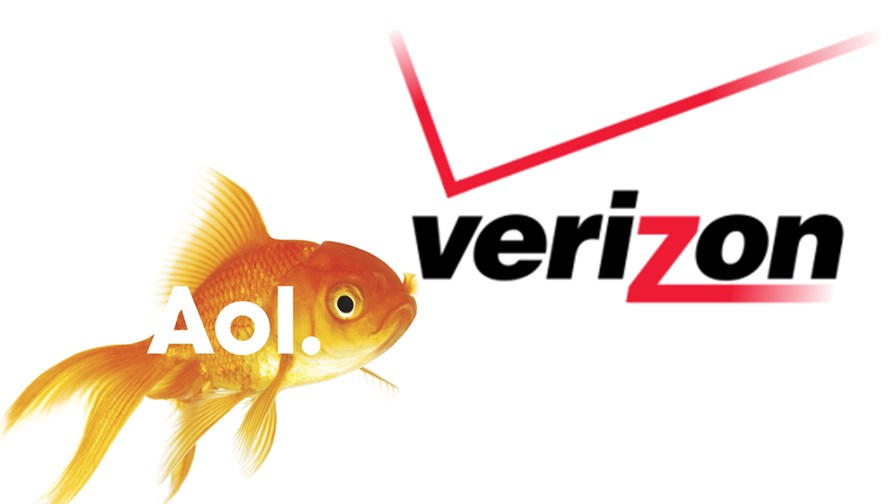
It took several years, but AOL has finally found a new benefactor: US telco Verizon. In the five years since AOL was spun out of Time Warner, following a disastrous mega-merger in 2000 when (hard to believe now) AOL actually bought the mighty Time Warner for $182 billion, the company has sought to re-invent itself. It has been linked to several other larger players, most notably Yahoo, but it just wasn’t wanted; there was very little love out there.
Until yesterday, when Verizon agreed to pay $4.4 billion in an all-cash deal to acquire AOL.
The deal has divided the pundits. There are those who buy into AOL CEO Tim Armstrong’s line that the deal is all about Verizon helping it to create a stronger mobile video service. And there are others who see this as something of a mess, lacking a really clear-cut reason –an out-dated business concept driven by a lack of understanding about today’s telecom-media relationship, with too many echoes of the old Time Warner deal.
AOL is a very different company to that of 2000, or even 2009 when its Time Warner adventure was finally over. Today, it is most known as the owner of prominent media sites and blogs, including the Huffington Post and TechCrunch. But these diverse properties are proving very difficult to monetise, and it is unclear how the Verizon deal will change this.
But behind its public front, AOL has been steadily acquiring a number of advertising technology companies, such as Adap.tv. Indeed, Armstrong explicitly referenced this many times in his staff memo yesterday. Here’s perhaps the most pertinent quote from that memo:
Armstrong: “We have the opportunity to build a unique and globally scaled media technology company with the scale and resources we need to make that happen. AOL is back and now we are joining forces with Verizon to build the best media technology company in the world. Let’s mobilize.”
What’s in it for Verizon?
For Verizon, the deal suggests a strategy to focus on content and a further move away from being a carriage provider. In a statement it said that the acquisition further drives its LTE wireless video and OTT strategy, as well as supporting its IoT platforms. So that’s most of the buzz words covered, just needed a mention of 5G and it would be bingo.
“AOL has once again become a digital trailblazer, and we are excited at the prospect of charting a new course together in the digitally connected world,” said Lowell McAdam, Verizon chairman and CEO. “We’ve been strategically investing in emerging technology, including Verizon Digital Media Services and OTT, that taps into the market shift to digital content and advertising.”
We get the idea that it pays for a telco to own a strong digital advertising and technology skillset, that’s becoming ever more imperative, but content as well? How many past attempts at telcos being content owners have worked out? Not many. Exclusive premium content is a different matter, such as BT’s ownership of football rights in the UK, but blogs and news? And one can only wonder at the reaction of AOL’s blog employees this morning.
Armstrong is a former Google executive, so he gets mobile advertising. Indeed, AOL’s platform business (which contains the media technology businesses) grew revenues by 21 per cent last year, compared to just 8 per cent growth from its publishing properties, although the platforms side is not yet making money. As for the Huffington Post, the latest speculation is that it could be spun out and sold off to another publishing company, with Germany’s Axel Springer being the current favourite.
But here’s another thought: the first quarter of 2015 was the first time in recent years that the total number of net additions by pay TV providers in the US actually fell. Verizon of course operates the FiOS cable service, reaching about 15 million homes, although its video service has only been taken up by about a third of them.
So a mobile-first OTT strategy, independent of FiOS, makes sense; especially when you recall that Verizon last year bought the assets of OnCue, Intel's Internet-based TV platform. Mind you, Verizon’s Sugarstring tech blog, which launched last October, was quickly closed after allegations of editorial restrictions. But maybe it’s learned a very painful lesson from that venture, and is determined to have another crack.
It therefore follows that perhaps this deal isn’t purely about advertising technology after all… It looks like Verizon and AOL will keep us guessing for some time to come.
Email Newsletters
Sign up to receive TelecomTV's top news and videos, plus exclusive subscriber-only content direct to your inbox.




